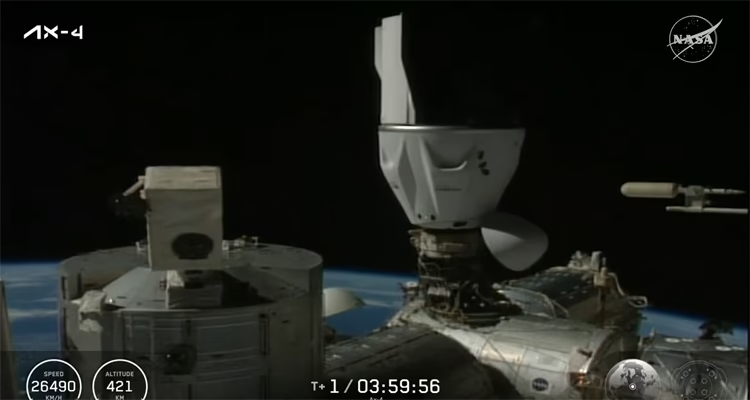
New Delhi: In a historic milestone for India’s spacefaring journey, Group Captain Shubhanshu Shukla became the first Indian astronaut to reach the International Space Station (ISS), docking successfully aboard the Crew Dragon capsule of the Axiom-4 mission on Thursday, just after 4 PM IST.
Launched over 24 hours earlier aboard a SpaceX Falcon 9 rocket, the capsule completed its complex space rendezvous and docking manoeuvre with the ISS—marking a new chapter in India’s participation in human spaceflight beyond Earth’s orbit. Shukla now joins the exclusive ranks of Indian space travellers, becoming only the second Indian in space after Wing Commander Rakesh Sharma’s Soviet-backed mission in 1984.
Four-Nation Crew, Two Weeks in Space
The four-member crew of Axiom-4 includes:
- Mission Commander Peggy Whitson (USA)
- Pilot Shubhanshu Shukla (India)
- Mission Specialists Sławosz Uznański-Wiśniewski (Poland) and
- Tibor Kapu (Hungary)
The team will remain aboard the ISS for approximately two weeks, participating in a range of scientific research and zero-gravity technology demonstrations.
Docking: A Precision-Oriented Ballet in Space
The docking procedure itself was a high-precision, multi-hour operation. After matching the ISS’s orbit through complex trajectory adjustments, the Crew Dragon capsule used LIDAR sensors and onboard cameras to execute a fully autonomous docking.
Axiom Mission 4 aboard the @SpaceX Dragon docked to the station at 6:31am ET today. Soon the Ax-4 astronauts will open the hatch and greet the Exp 73 crew live on @NASA+. More… https://t.co/XmWYPa4BhT pic.twitter.com/LjjMd7DfmW
— International Space Station (@Space_Station) June 26, 2025
Once securely latched onto the ISS, the capsule underwent pressure checks, electronic linkups, and safety verifications before the astronauts were cleared to board the station.
India’s Science Takes Off in Orbit
Group Captain Shukla will spearhead seven critical experiments crafted by Indian scientists, part of a larger suite of over 60 international experiments being conducted on the mission. These projects span the fields of biology, medicine, material sciences, and space technology—with a shared aim to understand the impact of microgravity on human and biological systems.
According to ISRO, Shukla’s experiments were collaboratively developed by more than hundreds of Indian researchers, symbolizing India’s growing contribution to global space research.
A Mission Beyond Flags and Borders
Unlike the geopolitical space race of the 20th century, Axiom-4 highlights a new era of collaborative, science-driven space exploration. The mission’s long-term vision goes beyond Earth’s orbit—laying foundational work for future deep space missions and permanent human habitation in orbit and beyond the Moon.
Shukla’s journey marks not just a personal triumph, but a national leap forward—reinforcing India’s presence in the global space community.




